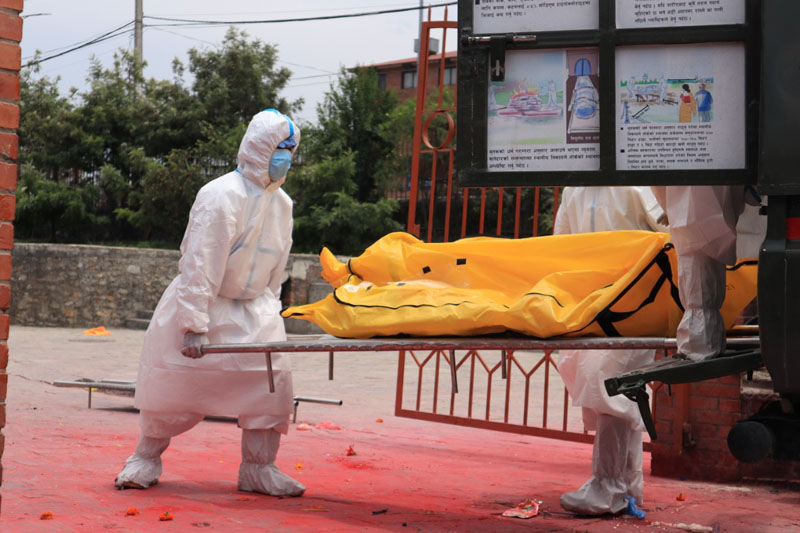

The situation in Nepal has gone from bad to worse in the last couple of days and everything looks grim at the moment. As of Tuesday, the country reported the highest number of COVID-related deaths at 225. Currently, Nepal’s fatality rate stands at 1.2 percent.
With the number of infections from the new variant of COVID-19 increasing on a daily deadly basis, hospitals in Nepal are overwhelmed with a shortage of healthcare workers, beds and oxygen. While political parties are playing with figures and trying to form the next government the country is facing a surge in the number of infections and fatalities daily.
People want political leaders to tackle the pandemic instead of indulging in political bickering and power games.
Pallav Rajbhandari’s family fell victim to COVID as his sisters, niece and mother tested positive for the virus. He says, “Last year, my eldest sister and her daughter tested positive. While my sister was doing just fine my family was worried for my niece who was just one-year-old at the time. But thankfully she recovered and is fine now.”
While things seemed fine for some time, a year later his mother and other sister tested positive. The doctors say that they are going to be fine and there is nothing to be worried about. But looking at the present situation, how could they not be worried?
“Things are getting very dire in Nepal and I feel the political parties and government needs to pull up its socks and start taking responsibility. Now is the time to stop all the bickering and start getting things done like adding hospital beds and ensuring steady supply of oxygen,” says Rajbhandari.
Meanwhile, Prasansa Char, owner of a small business says that things may not have been as bad if everyone had received their vaccination. “I bet it will be like the last time around. The government will announce how much they spent to deal with the situation and lift the lockdown so as to impel people to pay their taxes,” she adds. “There will be no change in anything.”
Char mentions that social media is flooded with reports of infections and deaths due to COVID-19 which actually creates fear among people and affects their mental wellbeing.
Dibin Shahi writes content for videos. He says, “Honestly, looking at the rate of infection I really do not mind the lockdown. But what bothers me the most is the fact that we could have avoided the situation if the government had taken proper steps.” He states that the government should have closed the Nepal-India border when things were getting bad there. “Also, large gatherings should have been restricted and emphasis should have been on getting more people vaccinated,” he adds.
“I still have to go to work despite hoping I could stay safe at home,” Pratikshya Pokharel, assistant manager at Citizens International Bank. “Things are getting very scary nowadays, yet many are not taking the lockdown seriously. And as for the politicians, I wonder if we can depend on them at all. People are dying and the pandemic is raging but they are focusing on the politics and power,” she says.
Pokharel wonders what will happen if she falls sick? “The hospitals are not taking in patients anymore as they do not have enough manpower, beds, or oxygen to give. So why is the government not managing these important things? Why are they not focusing on saving lives?”
“The situation in Nepal is very chaotic right now but it is not just the government’s fault,” says Laxmi Shrestha, a field officer at Prabina Foundation, adding, “We are all to blame for the situation we are in now.”
She mentions that we could have put pressure on the government to close the borders but we were all busy going about with our own things. “And after the first lockdown was lifted we could see people on the streets without their masks.”
On a different note, she adds that she has the highest regard for health workers on the frontline but the private hospitals should also be mindful of the fees they charge. “In some hospitals, the fees are so exorbitant that most people would not be able to afford treatment,” Shrestha mentions.
Yashodha Gautam who owns a small stationery shop says, “There is no help for people like us, who will not be able to afford the medical expenses at private hospitals. While the government is pointing fingers at each other there are people who are not able to return home and do not know what they are going to do the next morning.”
Gautam says, “While the government is dilly dallying, there are people who are dying. There are far more important things to worry about in this time of pandemic, but yet they choose to ignore them all.”